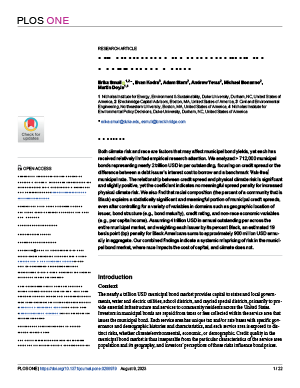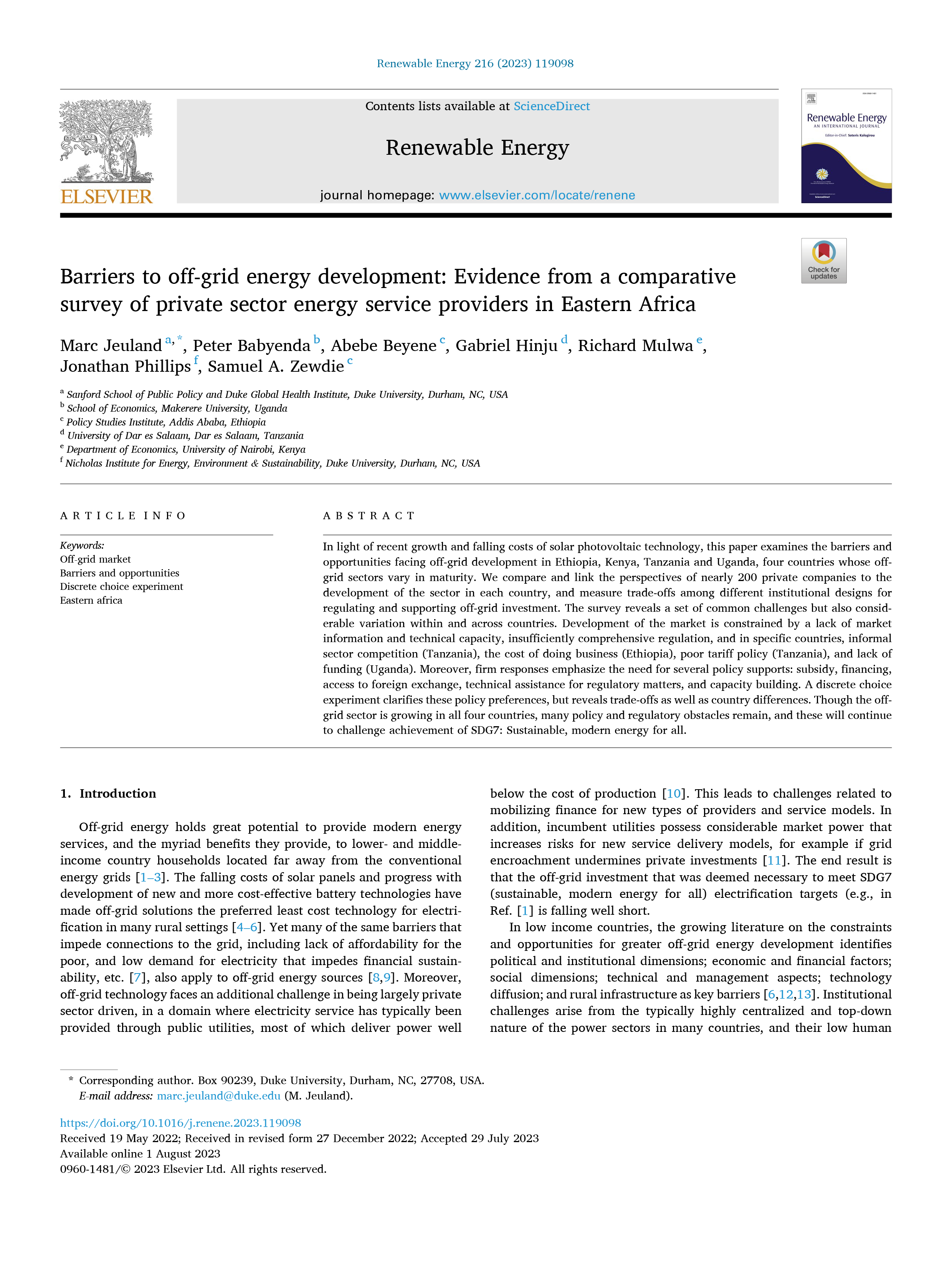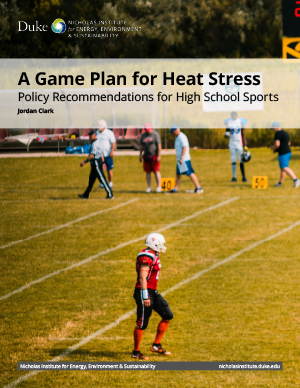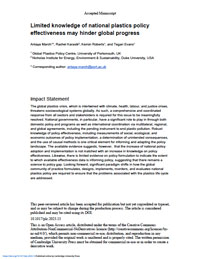Publications
Higher Temperatures in Socially Vulnerable US Communities Increasingly Limit Safe Use of Electric Fans for Cooling
Use of electric fans can help people stay cool if they can remain hydrated and if temperatures are low enough. Yet, there are limits to how hot it can be to safely use a fan—when temperatures are too high, a fan will increase the amount of heat traveling over the skin. We use data based on historical meteorological observations to study the number of hours in the continental US that exceed recommended temperature thresholds for safe fan use. We also examine where climate conditions considered unsafe for fan use overlap with socially vulnerable communities.
Climate, Race, and the Cost of Capital in the Municipal Bond Market
Both climate risk and race are factors that may affect municipal bond yields, yet each has received relatively limited empirical research attention. The authors analyzed >712,000 municipal bonds representing nearly 2 trillion USD in par outstanding, focusing on credit spread or the difference between a debt issuer’s interest cost to borrow and a benchmark “risk-free” municipal rate. The authors' combined findings indicate a systemic mispricing of risk in the municipal bond market, where race impacts the cost of capital, and climate does not.
Barriers to Off-Grid Energy Development: Evidence from a Comparative Survey of Private Sector Energy Service Providers in Eastern Africa
In light of recent growth and falling costs of solar photovoltaic technology, this paper examines the barriers and opportunities facing off-grid development in Ethiopia, Kenya, Tanzania, and Uganda, four countries whose off-grid sectors vary in maturity.
Making Clean Energy Transitions More Inclusive: Evidence, Knowledge Gaps, and Policy Options in Low-Income Economies
Access to reliable renewable energy and energy efficiency can provide significant climate, development, and equity benefits. Transitions to clean energy are compatible with sustainable and equitable development and women’s economic empowerment. However, in the absence of adequate policies, they may reinforce existing inequalities. This policy brief summarizes the evidence that supports and knowledge gaps that hinder clean and inclusive energy transitions.
A Game Plan for Heat Stress: Policy Recommendations for High School Sports
High school athletic associations (HSAAs) bear the responsibility of ensuring the health and safety of student-athletes. Exertional heat illness poses a significant risk, making this a task of increasing urgency in light of climate change and rising temperatures. This policy brief builds on prior research to offer recommendations to HSAAs as part of an ongoing commitment to safeguard student-athletes from heat-related illnesses.
Limited Knowledge of National Plastics Policy Effectiveness May Hinder Global Progress
Policy effectiveness is a critical measure for assessing whether policies are working and determining necessary adjustments. However, understanding the effectiveness of plastic policies is a significant gap in the toolkit driving solutions to the plastics crisis. This review examines effectiveness evaluations and existing tools for assessing policy effectiveness.The review further identifies the barriers to understanding effectiveness before proposing ways forward. Most studies focus on plastic bag bans or taxes, neglecting other policy instruments.
Accounting for Residential Nonpayment Risk for Water Utility Financial Sustainability
Residential “nonpayment risk” for water utilities—the risk of revenue loss from residential customers not paying water bills—is a financial threat for water service providers that remains poorly understood. The authors developed a new heuristic model to categorize and evaluate water utility pricing (rate setting) strategies responsive to the effects of nonpayment (i.e., delinquency) on water utility revenues. The model is the first attempt, to our knowledge, to theorize the impact of residential nonpayment on utility revenues.
Sustainable Ocean Economy: Charting a Prosperous Blue Future from Risk to Resilience
To make the case for mainstreaming ocean sustainability and add to the existing literature, Citigroup carried out an original analysis consisting of two parts: (1) an assessment of impact materiality and revenue exposure for industries and a (2) geospatial analysis to identify potential hotspots of marine natural capital loss.
John Virdin of the Nicholas Institute was one of the expert contributors to this report.
Editorial: Emerging Challenges and Solutions for Plastic Pollution
In a special issue of Frontiers in Marine Science, “Emerging Challenges and Solutions for Plastic Pollution,” these authors and others provide a transdisciplinary collection of articles exploring plastic pollution issues and hypothesizing solutions. The topic is broad to include diverse approaches as contributions from all stakeholders are needed to provide a full perspective on the plastic waste problem.
Affordability of Household Water Services Across the United States
Households that cannot afford their water bills may lose access to drinking water and wastewater services. This study seeks to quantify how many households may struggle to pay for water services across 787 of the largest drinking water providers in the United States. It finds that basic water services are unaffordable for 17% of households analyzed (28.3 million persons). The authors select 6,000 gallons per month as sufficient to meet basic needs and define undue hardship as spending more than 4.6% of household income (one day of labor each month) to pay for water services.










